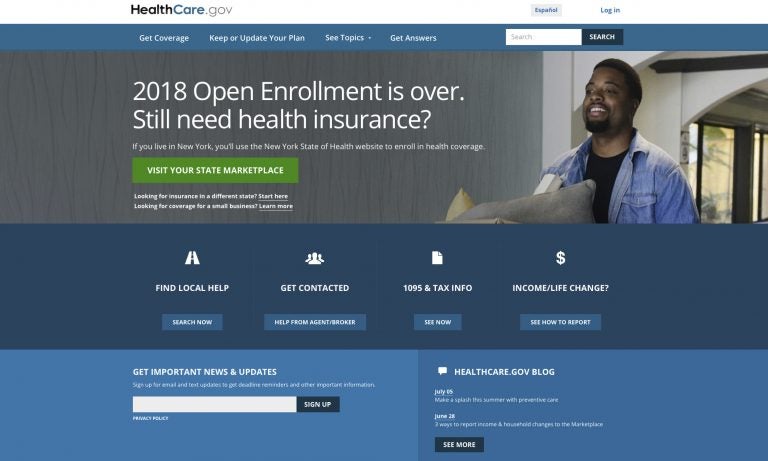At deadline health insurance numbers dropping in Delaware, region and nation
Multiple factors, from lifting tax penalty to less money for publicity, could be leading to fewer people enrolling for health coverage under Affordable Care Act.

The HealthCare.gov website main page. The Trump administration is clearing the way for insurers to sell short-term health plans as a bargain alternative to pricey “Obamacare” for consumers struggling with high premiums. But the policies don’t have to cover pre-existing conditions and benefits are limited. It’s not certain if that’s going to translate into broad consumer appeal among people who need an individual policy. (HHS via AP)
The number of people who signed up for health care under the Affordable Care Act marketplace was down as the deadline hits today.
Nationally, “Obamacare” sign-ups were down about 10 percent compared to last year. Pennsylvania’s numbers are down about 20 percent and New Jersey is down about 15 percent. Delaware saw a drop of about 10 percent in sign-ups through December 8, the most recent date totals were available.
While final numbers won’t be tallied for a few weeks, Delaware Health Secretary Kara Odom Walker says the final days leading to the deadline were very busy.
“We are a little bit worried with this downward trend of 10 percent means we’re losing people,” Walker said. “We don’t know why the numbers are down, but for sure the cut in funding for federal marketing has impacted our ability to get the word out.”
Last year, Delaware got $600,000 in federal money to promote sign-ups. This year that dropped to $100,000, and some states got no funding for outreach.
The drop could also be attributed to a move by Congress earlier this year which eliminated the tax penalty for not having insurance in 2019. While Congress did not repeal the Affordable Care Act, it removed the so-called “individual mandate” as part of the tax overhaul President Trump and Republican leaders enacted.
Walker thinks removing the tax penalty affects some people’s decisions. “That can be something that people say, ‘well, it’s not worth it, and I’m just going to take my chances and be uninsured,’ and these are people that maybe have done that, made that choice in the past,” Walker said.
When the penalty forced more people into the system, it helped keep prices down for everyone, Walker said. “More people get preventive care which we know matters and helps prevent long term consequences of health care issues.” When it was put in the original law, the penalty was meant to encourage generally healthy people to buy insurance.
Final numbers on enrollment should be available early next year.
WHYY is your source for fact-based, in-depth journalism and information. As a nonprofit organization, we rely on financial support from readers like you. Please give today.





